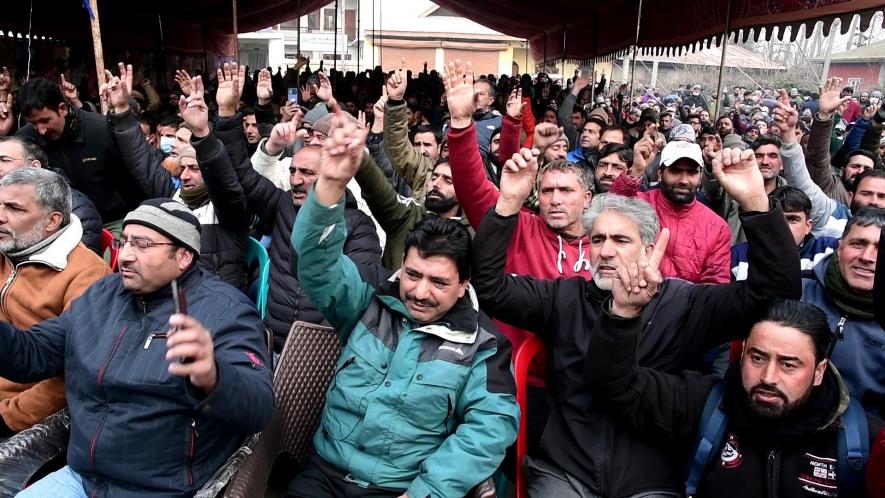J&K Power Dept Employees on Strike Against Proposed Privatisation, Threaten Wider Stir

Srinagar: More than 20,000 striking employees, including engineers and linesmen, of Power Transmission Corporation Limited and Power Distribution Corporation Limited of the bifurcated J&K Power Development Department (PDD) have launched a stir in the region demanding roll-back of decision to privatise assets and payment of pending salaries, triggering power crisis in several parts of the Union territory.
The Army had to be called in Jammu on Sunday to continue maintenance and repair work of power transmission lines, stations and transformers after the employees indefinite strike, which includes daily-wage workers, engineering staff and other technical and non-technical, against the proposed merger of the divisions into the Power Grid Corporation of India.
The employees have said that if their demands are not met, the power employees in Ladakh and other employee unions across the country would also join their strike.
Munshi Majid Ali, convenor of Power Employees Coordination Committee, Kashmir, told Newsclick that the employees want the “proposal shelved”. “The promises made during the unbundling of the PDD in 2019, which included the regularisation of TDLs (temporary daily labourers) and PDLs (permanent daily labourers), should be fulfilled. Our salaries, being paid as grant and for which we have to beg every month, should be on par with other government employees,” he said.
In the Kashmir division, which is gripped by a severe cold wave since last week, divisional commissioner PK Pole, however, said that the strike has had no “major effect” as 50-60 out of the total 36,000 transformers in the UT usually get damaged every winter.
“The number of damaged transformers hasn’t increased. In South Kashmir’s Shopian, Kulgam and Pulwama, the power supply has been affected in rural areas. Deputy commissioners are looking into the problem. In Srinagar, a damaged feeder around Dal Lake has been restored. The officials are doing their work and there is no major crisis,” Pole added.
In Jammu, division commissioner Raghav Langer requested the Army on Sunday to assist the administration in dealing with the crisis. “We would like to hereby requisition the Indian Army to assist in the restoration of the essential services by provisioning manpower to main critical electricity stations and water supply sources,” he said in a communication sent to the Army. Subsequently, the Army deployed its personnel around the electricity stations and other key areas for maintenance and repair work, which some locals said was “not necessary”.
Sachin Tikoo, convener of Power Employees Coordination Committee, Jammu, blamed the authorities for pushing them to strike work. “There are already three corporations and the government is planning to privatise power grid stations. They are handing our resources to them on a platter like we have seen how NHPC exploited our power generation resources,” he was quoted as saying in Jammu.
Tikoo alleged that PDD had not recruited a single employee in the past five years and salaries were pending as well. The employees are also demanding regularisation of daily wagers, who number in thousands across the region.
Various political parties and employees’ unions have supported the striking employees and urged the authorities to address their concerns.
In a statement issued in Srinagar, Apni Party leader Altaf Bukhari said several such arbitrary decisions have always cause inconvenience to the people of J&K. The government should review its decision at the earliest to resolve the crisis and avoid further inconvenience to the people, he added.
The Jammu and Kashmir National Conference (JKNC) on Sunday said the J&K government lacks the political authority to privatise the power sector adding that the measure will put an extra burden on consumers by making the basic public services costlier.
“A profit-seeking operation may not provide electricity to the poor at affordable rates and health care and other employment benefits to the employees, who put their lives at risk by ensuring round-the-clock electricity to consumers,” JKNC general secretary Ali Muhammad Sagar said.
In a statement, Abdul Qayoom Wani, chairman, Jammu and Kashmir Civil Society Forum, under the banner of Power Employees and Engineers Coordination Committee, said that the employees are genuine in demanding a white paper on regularisation of engineers, PDL and TDL staff and casual labourers besides opposing the government’s move to privatise this vital sector.
“The Power Development Department was bifurcated into two corporations and the employees were assured payment of timely wages, promotions and regularisation of daily wagers. However, the promises were never fulfilled and now the government is trying to privatise the grid stations,” Wani, a former employees’ union leader, said.
While many Kashmiris are facing harsh difficulties due to the ongoing strike, several others feel that privatisation will only increase their woes. “Privatisation will have far-reaching consequences, especially for the lower- and middle-income groups. Such decisions will only hurt consumers in the end,” Majid Ahmad, a resident of Anantnag, told Newsclick.
Get the latest reports & analysis with people's perspective on Protests, movements & deep analytical videos, discussions of the current affairs in your Telegram app. Subscribe to NewsClick's Telegram channel & get Real-Time updates on stories, as they get published on our website.
























